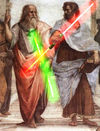Ultimate Question
“In Soviet Russia, question asks YOU!!'”
– Russian Reversal on questions
The Ultimate Question was asked by the Greek philosopher Parmenides on March 3, 553 BC.
However, nobody heard the Question and Parmenides didn't write it down. Later philosophers have attempted to reconstruct the Question:
Oscar Wilde: "What if this were not a hypothetical question?"
Socrates: "Man cannot know absolute truth, but why can't we at least know where to go to get laid? Without getting the clap, I mean."
Plato: "If absolute truth is unattainable and we observe only its remote shadows, like men in a cave seeing shadows of outside reality dancing on the walls, does this explain why the hell I keep waking up with bat piss in my hair?"
Thomas Aquinas: "God is the absolute truth, so why did He get this thing going with the Jews? Why didn't he create Christians right from the get-go instead of a bunch of kikes?"
Spinoza: "The universe is God and is the absolute truth, but why does the universe have to include diarrhea? Excuse me, I gotta run. Heh, I made a punny."
Descartes: "Is the only absolute is that I think, therefore you am? No, wait a minute, I wrote it down...You think you are, but I think you are not therefore... uh, therefore I am not thinking you are thinking...Man, this migraine is killing me."
Locke: "Empirical absolutes are the only reality that is accessible to crabs, so must mankind be relegated to being the dreams of crabs? I really like crabs, with a nice bit of Scottish butter and some mayonnaise. Are crabs the ultimate reality? I really think they must be."
Modern thoughts[edit | edit source]
However, the consensus among modern philatelists is that it is only by reconstructing Parmenides' life and times that we can find out what his Ultimate Question was. Tim Binderankles, PhD, DDS, WMD, resident Professor of Philatelie at the Budapest University for the Terminally Idiotic, has written a monograph on the subject which is considered definitive.
- Premise 1: Nobody cares.
- Premise 2: There's no point anyway.
- Premise 3: Nobody loves me.
- Conclusion: Why bother?
Upon peer review, Dr. Binderankle's findings were accepted throughout the historical philosophist community as correct, although Dr. Binderankle himself was told by many of his colleagues that he won't be invited to any more philatelist parties until he's wiped off his emo make-up and stopped cutting himself and quit "behaving like an emo girl, you emo girl".
See also[edit | edit source]
| Philosophy |
|---|
 |
| Philosophers |
| Philosophies |
| Questions |
| Answers |
| Related |